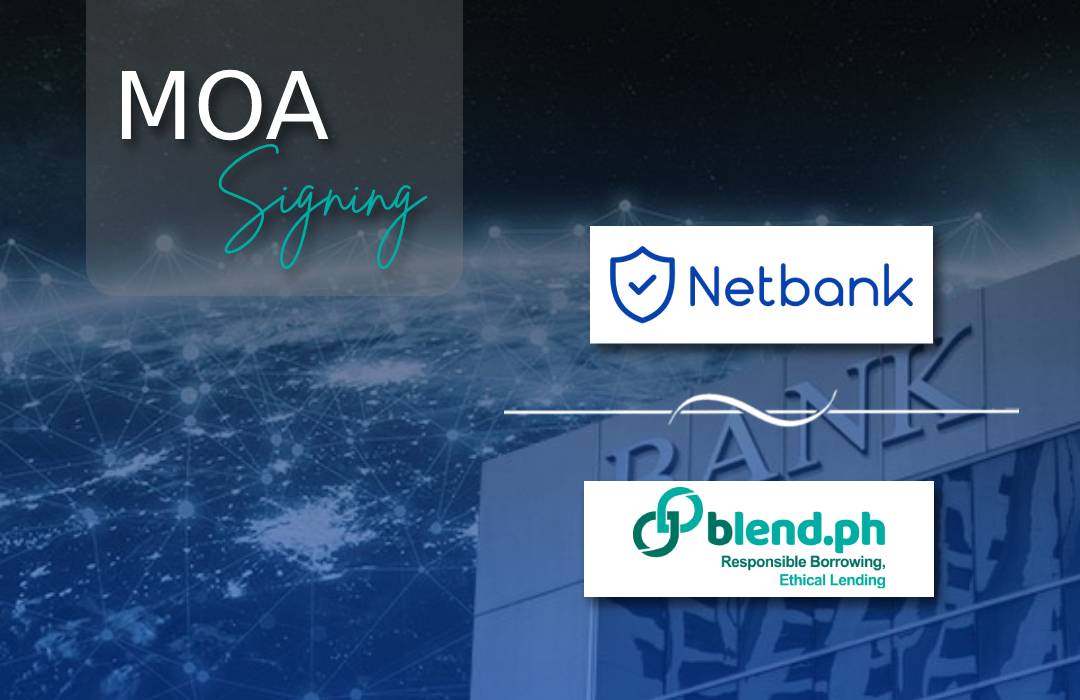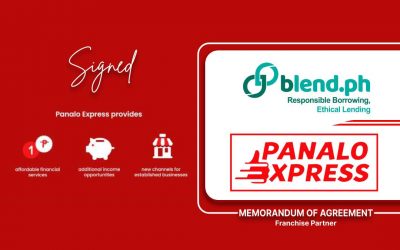BlendPH and Netbank Join Forces, Unfurling Full Netbanking Benefits For Customers

Adversity, like the pandemic, makes strange bedfellows. Yet it also brings together like-minded entities, like one of the Philippines’ leading peer-to-peer funding platforms, Blend.ph, which recently partnered with model bank Netbank. Teaming up opens a host of netbanking benefits to customers who include entrepreneurs taking the franchise route.
Netbank is at the forefront in providing banking as a service platform in Southeast Asia. The partnership bank and P2P funding platform joined forces to better provide a greater number of Filipinos with financial products and services resulting to a positive difference to their lives.
The partnership melds core banking technology from Netbank with the fintech edge and growing client base of Blend.ph. Both Blend.PH and Netbank are poised for accelerated growth. Both entities have the modern systems and channels to make transactions faster, allowing customers more time to focus on their own clients and grow their business.
“We are very happy with the flexibility and ease that Netbank offers to its lending and fintech partners,” said Jay Bautista, managing director of Inclusive Financial Technologies, Inc. He continued, “With our continued business expansion, we are glad to work with a partner like Netbank.”
Strong Digital Financial Ecosystem, Seamless User Experiences
Blend.ph has steadily been building a strong digital financial ecosystem through its constant collaboration with institutional bank partners. The end result: seamless user experiences as well as faster response and approval time for loan applicants. It also makes good sense to partner with organizations carrying out the same vision: help expand financial inclusion in the Philippines.
In the Philippines and across the world, people have varying financial requirements. There are those who require instant cash loans, or small bursts of funds to pay off bills. Fast loan or emergency loan is a kind of funding usually processed at faster time than other loans, like, say, a franchise loan of a bigger amount. Blend.ph offers both types of loans, along with others like salary loan and seafarer’s loan.
With the COVID-19 pandemic creating cash flow problems for many individuals and businesses, finding new income-generating activities became a must. Resilient as they are, most Filipinos with families to sustain set out to form their own small businesses.
Some of them latched on to established brands or names with a tried-and-tested business model, franchising. Blend.ph witnessed that burgeoning segment, and has been providing lending assistance to small and medium businesses venturing into the franchise business, or expanding.
Netbanking Reigns
Blend.ph is able to apply its internet- and mobile-centric business model and it resonated with both young and old who have become accustomed to netbanking. Among the main advantages of online banking or transacting services online are 24/7 accessibility (barring scheduled downtimes), greater control over finances, and cost-efficiency.
The situation years back of a borrower in need of funds quickly may be likened to a shipwrecked person who takes shelter beside a sleeping monster, or a usurious lender (applying “5-6 interest”). Moreover, it can be tedious for many bank clients to apply for financing from financial institutions that require paper documents to be snail-mailed or submitted personally.
Nowadays, one can take out a loan from an online platform with track record of experience, without leaving the doorstep. Over the past several years, there has been pent up demand for partnership bank arrangements.
A model bank works double duty as an electronic banking expert. They go the extra mile to have digitization and also offer a growth roadmap for client-firms, the way Netbank does. It is fully regulated by the BSP, and is armed with a deep knowledge of regulatory requirements
The Blend.PH and Netbank system enables hardworking and qualified Filipinos to access financial services in a secure and simple, hassle-free manner.
B2C, Fintech and Banks
Fintech, or financial technology, may have been coined just a few years ago, but tech-enabled financial services date back many, many years ago. Financial services, aided by tech, paved the way for credit cards in the 1950s, netbanking in the 1990s. At the turn of the millennium, contactless payment technology was likewise finetuned. It was evident even back then that banks can play well and go with the fintech tide.
Today, the sustained collaboration between current financial institutions and fintech partners that are making their mark in the Philippine business scene yields greater innovation. While fintech startup ideas partnership bank models were still being formed, business-to-consumer (B2C) had gained ground.
Indeed, way before the pandemic era, monetizing hobbies and interests using tech tools, some of them passive income-generators, started to thrive. The past pandemic year, e-commerce portals and cashless payment systems have become the norm. Even ride-sharing and shopping apps offered cashless payment options.
Enabling consumers to get good deals, and stay-at-home arrangements that glued people to their devices, have further bolstered their growth. B2C or business to-consumer is the term that involves that process whereby businesses sell products and services directly to consumers. No middleperson.
Just as online B2C became a threat to traditional retailers (many of whom reaped profits from price markups), alternative financing has disrupted conventional banking systems, so banks have had to adapt. Many banks have stepped up their digital transformation – by themselves or with fintech partners.
On the part of investors, local and international trends show that the most investment-attractive services are finance and investment, as well as payments and infrastructure, particularly peer-to-peer lending/online lending, e-commerce services with mobile wallets, and the like.
These are exciting times for banks, fintech partners, and e-commerce businesses. P2P lending platforms can tap massive opportunities in areas with high internet connectivity. There is just no letting up, as fintech partnerships help organizations retain customers and continue to grow the bond of trust.
Go with a P2P platform that can demonstrate the right balance between protecting lenders through a strong risk management framework, good level of transparency on loans, and high service levels. That high service level applies to both lenders and borrowers. Visit www.blend.ph/ to know which online loan product best suits you.
Choose from the alternative loans options for Pag-IBIG Multi-Purpose Loan at BlendPH
Qualified members of Pag-IBIG Multi-Purpose Loan can process their loans through the Pag-IBIG...
Gas LPG partner M-GAS and BlendPH agree to offer more franchise loans to Filipinos
The leading and affordable gas LPG in the Philippines, M-GAS, partners with BlendPH to offer more...
Travel tips during COVID: Don’t run out of cash
SUMMARY: Because of quarantine restrictions, a lot of people are looking forward to traveling...
Esting’s Bellychon signs MOA with BlendPH for more affordable franchise loans
Esting’s Bellychon signed a memorandum of agreement or MOA with BlendPH to offer more affordable...
Right Choice Finance Partners with BlendPH to provide lower business loan rates in the Philippines
Right Choice Finance adds another trusted partner and affiliate Similar to what colors are to cars...
Bills Payment Business, Panalo Express, to offer more franchise loans thru partnership with BlendPH
SUMMARY: Panalo Express, a bills payment business, partners with BlendPH, a loan agency, to offer...






